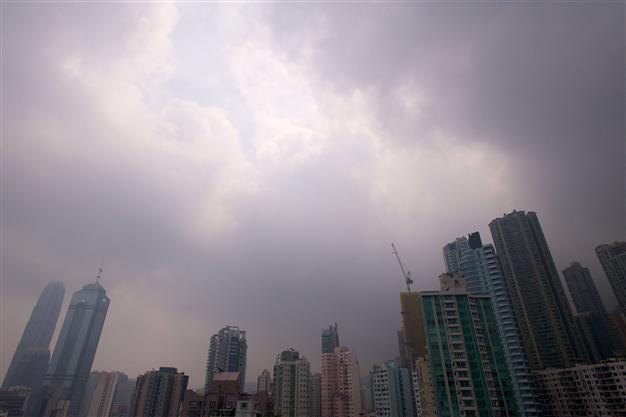25 dead as typhoon hits China, flight chaos in Hong Kong
HONG KONG - Agence France Presse

The sun breaks through the clouds over Hong Kong on September 23, 2013 as Typhoon Usagi moves out of the territory. AFP Photo
Typhoon Usagi killed at least 25 people after crashing ashore in southern China, throwing the region's transport systems into chaos and leaving tens of thousands of airline passengers stranded in Hong Kong on Monday.Schools and businesses were shut as activity in the normally teeming financial hub slowed to a crawl after Usagi -- the world's most powerful storm this year -- battered a long swathe of coastline with torrential rain and winds of up to 165 kilometres (103 miles) per hour during the night.
The deaths were reported by Chinese state media after Usagi made landfall near Shanwei city in Guangdong province northeast of Hong Kong on Sunday evening, prompting the highest-level alert from the National Meteorological Center.
The reports by Xinhua news agency did not say how the 25 were killed but said all the deaths were in Guangdong after the typhoon brought down trees and damaged roads. Dozens more were injured in accidents, it added.
Bullet trains from Guangzhou city to Beijing were suspended and Xinhua said winds were strong enough near Shanwei to blow cars off the road. More than 47,000 fishing boats were in harbour and schools were closed in 14 coastal cities.
Usagi had previously killed two people in the Philippines and unleashed landslides and power outages across southern Taiwan at the weekend as it ploughed through the Luzon Strait with ferocious winds and heavy downpours.
Monsoon rains worsened by Usagi brought flooding on Monday to the Philippine capital Manila and nearby provinces.
As the typhoon bore down on Hong Kong, operators shut down one of the world's busiest sea ports and nearly 450 flights were either cancelled or delayed on Sunday as Cathay Pacific and other airlines imposed preemptive suspensions.
Hong Kong's Observatory said it was the strongest typhoon to brush the city since 1979. Tens of thousands of people had their travel plans upended with ferries and trains also disrupted, while Cathay resumed flights only from noon (0400 GMT) on Monday.
Many passengers were forced to stay overnight at the airport, sleeping on the floor or spending the night playing card games. Many milled around the departure hall hoping to rebook their flights. But handwritten signs warned them that there was little chance of getting standby seats on flights out Monday and to check back later. "We've waited for so long... and we still can't leave. Who would not be unhappy?" Iris Ouyang, an irate 26-year-old marketing officer from Beijing told AFP, after waiting more than 12 hours for her China Southern flight.
"Before we had good feelings towards Hong Kong, but not anymore." Airlines scrambled to clear the backlog of passengers by regrouping passengers and arranging extra flights as more than 1,000 passengers waited in the check-in area.
But airport authorities foresaw a second day of flight disruptions, with more than 480 scheduled flights being cancelled or delayed on Monday.
Officials in Hong Kong, which is well versed in typhoon preparations, said 13 people were injured during the storm, while more than 60 trees had fallen.
Major thoroughfares were empty and signboards swayed in the wind early Monday, but some residents ignored official warnings and headed out to the coast to brave the wind.
"I heard the typhoon was strong so I wanted to feel it," one woman told Cable TV.
The city's stock market opened at 1pm on Monday after all storm warning signals were lowered in the city.
On its way towards southern China, Usagi had forced the evacuation of 3,400 people in southern Taiwan. Twelve people were injured in Kinmen, a Taiwan-controlled island off China's Fujian province, after they were hit by falling trees.
Prior to hitting Taiwan, Usagi brushed the far north of the Philippines where a man and a woman drowned on Friday when their boat capsized in high seas. Another three people remain missing.
"Local disaster officials told us this was the strongest typhoon they had experienced in years," regional civil defence officer Ronald Villa told AFP on Sunday.
















